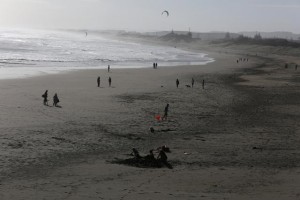After seven weeks trussed up with some of the world’s toughest coronavirus curbs, New Zealanders like Jim Boult leapt at the chance to cheer the end of the country’s lockdown on Thursday – literally in his case, with a bungee jump.

As the mayor of South Island adventure tourism resort Queenstown, Boult’s vault off Kawarau Bridge was as much a move for TV cameras to attract visitor attention as an act of sheer exuberance. But the sense of relief at the prospect of a return to some kind of normality was shared across the country.
In Auckland, residents queued from midnight at barber shops and salons for their first chance of a professional hairdo in nearly two months, according to local media reports. In Wellington, families strolled along the waterfront, while others waited at stores set to reopen with safety measures in place.
“It’s been an onslaught of people booking in so we’re flat out for the next two three weeks,” Ali Kamaruddin, a barbershop owner in northern coastal city Tauranga, told state broadcaster TVNZ. “We’re expecting everything, long hair, home haircuts, big stuff.”
While dramatically reducing the spread of the disease, some of the stricter social distancing restrictions worldwide delivered a big economic hit to New Zealand’s $200 billion economy, which is dependent on trade and tourism.
The country had fewer than 1,497 confirmed cases and fewer than 90 people are still sick. It reported extensive testing and no new cases for the third consecutive day on Thursday, and only 21 people have died.
Restrictions were eased by a notch in late April, but Thursday’s further easing to ‘level 2’ in the Pacific nation’s scale of alert allows for retail, restaurants and other public spaces including playgrounds to reopen.
Traffic returned to the country’s roads and office towers filled up with employees returning after weeks of working from home. Schools only open next week but offices were allowed to start on Thursday.
New Zealanders are allowed to travel between regions, students will be able to return to school from Monday, while bars will reopen from May 21. Social gatherings, including for weddings and other religions ceremonies, are to be limited to 10 people.
Back in Queenstown, Boult embraced the prospect of now-permitted domestic tourism.
“Enthusiasm for local travel will bring a much-needed boost to our local economy and the thousands of locals that will benefit from the return to work this will deliver,” said Boult.
Reuters


Share your thoughts